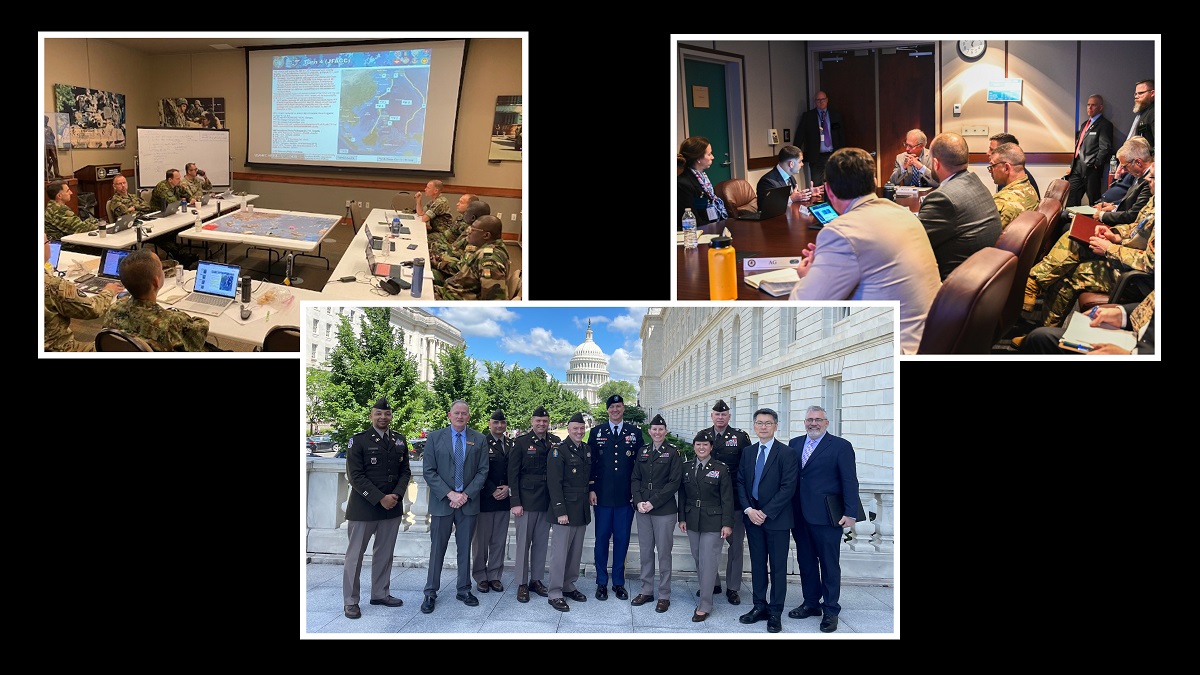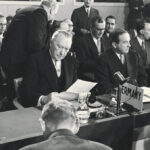
Last week, we noted the next few conversations veer into some of the “inside baseball” of how the Army War College educates strategic leaders. Episodes like this are mainly to inform incoming resident students about options available to them, but other listeners might be interested in getting some insights into the inner workings of senior joint professional military education. Host Tom Spahr sits down with the directors of three such opportunities: Bob Bradford, director of the Enterprise Management Enrichment Specialization (EM), Jerad Harper, director of the Joint Warfighting Program (JWP) and Mike Stinchfield, director of the National Security Simulation Exercise of Competition, Crisis, and Conflict (NSEC3). Their conversation examines the unique opportunities each of these enrichment and enhancement programs affords participants as they continue their growth towards becoming better critical thinkers, trusted advisers, and strategic thought leaders in the joint, interagency, intergovernmental, and multinational environment.
For more information on each of the programs you can contact the directors.
Professor Bob Bradford (EM) robert.bradford@armywarcollege.edu
Dr. Jerad Harper (JWP) jerad.harper@armywarcollege.edu
COL Mike Stinchfield (NSEC3) michael.stinchfield.mil@armywarcollege.edu
While [the Joint Warfighting Program] focuses on the employment of capabilities, [Enterprise Management] focuses on building capabilities. How does the Department of Defense do that task? Just as many of our graduates will be in the operational force, many will also have to be developing capabilities for the Army, Navy, Air Force and other parts of the joint force.
Podcast: Download
Bob Bradford is the Associate Professor of Defense and Joint Processes and Henry Stimson Chair of Military Studies at the U.S. Army War College and is in his seventh year on the Carlisle faculty. He is the Director of the Enterprise Management Enrichment Specialization (EM), an enrichment specialization. Bob served 30 years as an officer in the U.S. Army, the last 20 as an operations research analyst supporting enterprise decisions.
Jerad Harper, Ph.D. (Colonel, U.S. Army, Retired) is an Associate Professor in the Department of Military Strategy, Planning and Operations. He teaches Military Strategy and Campaigning, Joint Warfighting, and East Asia regional studies. He is the Director of the Joint Warfighting Program (JWP), an enrichment specialization.
Mike Stinchfield is a colonel in the U.S. Army and the Director of the National Security Simulation Exercise of Competition, Crisis, and Conflict (NSEC3), which is an Enhanced Program.
Thomas W. Spahr is the De Serio Chair of Strategic and Theater Intelligence at the Army War College. Tom has a Ph.D. in History from The Ohio State University and teaches courses at the Army War College on Military Campaigning and Intelligence.
The views expressed in this presentation are those of the speakers and do not necessarily reflect those of the U.S. Army War College, U.S. Army, or Department of Defense.
Photo Description: L-R The Joint Warfighting Program (JWP) conducts analysis of the most recent turn in the simulation; the Enterprise Management Enrichment Specialization (EM) concludes its D.C. staff ride; the National Security Simulation Exercise of Competition, Crisis, and Conflict (NSEC3) briefs former Provost James Breckenridge acting as the POTUS in a mock Tank Brief.
Photo Credit: U.S. Army photos





Regarding the U.S. Army War Colleges enrichment and enhancement programs, do any of these programs deal extensively with what might be called contemporary irregular warfare — and/or special forces (???) — type problems, for example, such I attempt to describe below?:
In the Old Cold War of yesterday, when (a) the Soviets/the communists were the ones seeking to achieve revolutionary political, economic, social and value change more both at home and abroad (so as to better provide for the wants, needs and desire of the communists and communism) and when (b) the U.S./the West, thus existentially threatened back then, became the ones attempting to contain and roll back these such revolutionary changes — back then, U.S. and allied/partner special forces could more easily find indigenous population groups to work with throughout the world; this because, back then, these such indigenous population groups’ ways of life, ways of governance, values, etc. — much like our own — were being existentially threatened by the communists and communism back then.
In the post-Cold War, however, when (a) the U.S./the West became the ones seeking to achieve revolutionary political, economic, social and value change more throughout the world (in our case, so as to better provide for such things as market-democracy) and when (b) nations such as Russia and China, thus existentially threatened, became the ones attempting to contain and roll back these such revolutionary changes — then, post-the Old Cold War, it would seem that now Russia, China and their allied/partner special forces these folks have become the ones who might more easily find indigenous population groups to work with throughout the world; this, because these such indigenous populations groups’ ways of life, ways of governance, values, etc. — much like those of Russia and China — are the ones, today, which are being existentially threatened, in this case, by the U.S./the West.
(Thus, in the New/Reverse Cold War irregular warfare scenario that I describe above, one might suggest that today — and as relates to the U.S./the West and our allies and partners special forces being able to find indigenous population groups to work with — to [a] achieve our “achieve revolutionary change more along market-democracy lines” goals — this [b] must be done by, with and through those indigenous folks who wish to overthrow and replace — and therefore not protect, defend and/or champion as in Old Cold War days — their time-honored [but now considered outdated and/or in the way?] ways of life, their time-honored [but now considered outdated and/or in the way?] ways of governance and their time-honored [but now considered outdated and/or in the way] values?)
If any of the U.S. Army War College’s enrichment and enhancement programs deal — somewhat or extensively — with the topic of “deterrence,” then might the “context” that I provide below be of some interest? Here goes:
Both here in the U.S./the West, and there elsewhere throughout the world today, should we not expect that entities who have gained (or who wish to gain and/or are in the process of gaining) significant power, influence, control, status, privilege, prestige, safety, security, etc. throughout the world — that these such entities cannot, and/or will not, be “deterred;” this, from fighting back against a U.S/West seeking to transform the states and societies of the world (to include own) more along ultra-modern market-democracy lines. (A process which, today as in the past, tends to threaten and undermine the power, influence, control, etc., of those who depend on the status quo for same?
In this regard, might we say that — any and/or all — of the U.S./the West’s various and sundry “instruments of power and persuasion” (however developed, deployed, utilized, etc.); any and/or all of these such instruments of power and persuasion are unlikely to be able to “deter” (a) the Islamists, from fighting back against these such unwanted and threatening transformations, to “deter” (b) N. Korea and/or Iran, from fighting back against these such unwanted and threatening transformations, to “deter” (c) Russia and/or China, from fighting back against these such unwanted and threatening transformations, and/or to even “deter” (d) certain status quo-dependent population groups here within the U.S./the West, from fighting back against these such unwanted and threatening transformations?
(A “deterrence” point of view and dilemma, thus, which indeed may be worthy of consideration at/in certain of the U.S. Army War College’s enrichment and enhancement programs? Herein, the developing, the deployment and the utilizing of such things as “deterrence capabilities,” these needing to be considered within the “context” that I provide above?)
With regard to the context that I present above, note that (a) the Islamists, (b) N. Korea and Iran, (c) Russia and China, and even (d) population groups here in the U.S./the West — note that these such entities would seem to have both a common cause and a common enemy — and thus, under the right circumstances, might come to see each other and each other’s natural ally?
(“Liberal democratic societies have, in the past few decades, undergone a series of revolutionary changes in their social and political life, which are not to the taste of all their citizens. For many of those, who might be called social conservatives, Russia has become a more agreeable society, at least in principle, than those they live in. Communist Westerners used to speak of the Soviet Union as the pioneer society of a brighter future for all. Now, the rightwing nationalists of Europe and North America admire Russia and its leader for cleaving to the past.” [See “The American Interest” article “The Reality of Russian Soft Power” by John Lloyd and Daria Litinova.])
Thus the viability (or lack thereof) of the concept of “deterrence,” this needing to take this such possibility (eventuality?; reality?) also into consideration?
Re: “deterrence” (etc.), might it also be worth considering that the context that I provide above; that this such context would seem to encompass (a) the so-called “war on terror” (for example, against the Islamists), (b) the so-called “great power competition (for example, against Russia and/or China), (c) other interstate conflicts (for example, against N. Korea and Iran) and (d) even the internal conflict going on within the U.S./the West itself today.
(Thus a perspective/a context, indeed, which might be worth considering; this, within the U.S. Army War College’s enrichment and enhancement and/or other programs?)